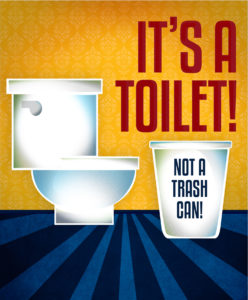Rethinking what’s flushable and what’s not
 Just because the package says they are disposable doesn’t mean you should flush pre-moistened personal wipes down the toilet. Many pre-moistened wipes don’t break down in the sewer system as toilet paper is designed to do. If you check the label closely, many packaged wipes state they are not to be flushed down the toilet. Even the wipes labeled as flushable may clog your plumbing, sewer lines and pumps and shorten the life of equipment in the sewer system.
Just because the package says they are disposable doesn’t mean you should flush pre-moistened personal wipes down the toilet. Many pre-moistened wipes don’t break down in the sewer system as toilet paper is designed to do. If you check the label closely, many packaged wipes state they are not to be flushed down the toilet. Even the wipes labeled as flushable may clog your plumbing, sewer lines and pumps and shorten the life of equipment in the sewer system.
At your home, the clog could lead to back-ups and expensive repair bills. For sewer utilities, clogs can cost millions of dollars each year to remove wipes that may mix with fats and grease in sewer lines to form massive clogs.
Other items to keep out of the toilet are cleaning wipes, disposable diapers, dental floss, paper towels, and pop-off scrubbers on toilet cleaning wands. These should all go into the trash.
At the national level, utility groups and manufacturers of so-called flushable products are working on an agreement about what should be labeled as flushable and the kind of labeling to be used.
But for now, remember toilets, and sewer systems, are designed to handle a few basic things, BUT that does NOT include wipes.
In 2021, the Charleston, South Carolina Utility settled a lawsuit with Kimberly-Clark, manufacturer of Cottonelle flushable wipes. Under the agreement, Kimberly-Clark promised to make a more disintegrable product and place the “do not flush” symbol more prominent on the packaging.
Although products like facial tissues, dental floss, cotton swabs, and kitty litter may flush down the toilet, they can cause clogged pipes for you and your neighbors. See Will It Flush? to find out more, and many thanks to City of Spokane Department of Wastewater Management for sharing its entertaining and educational video in partnership with WEF.





